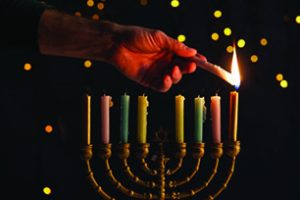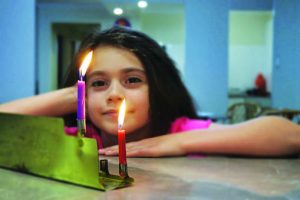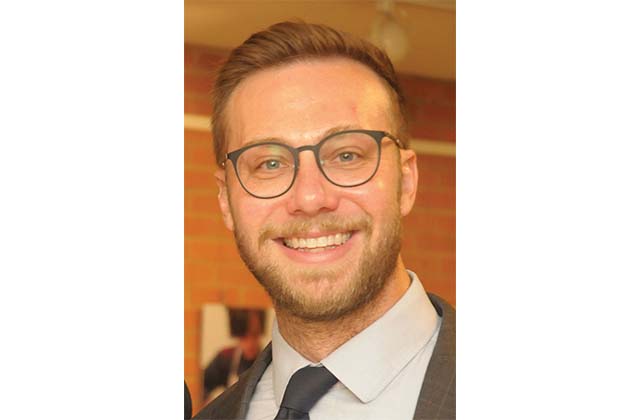By Rabbi Michael Knopf
There is something special about the first night of Hanukkah, when only one candle is lit. To some, the illumination of a single flame may feel underwhelming, a mere prelude to the holiday’s subsequent nights, during which we steadily and persistently build upon that first light.

But that first candle doesn’t simply serve to fuel our anticipation for our entire menorah to be illuminated, our homes filled with its radiance.
Rather, the first candle of Hanukkah represents the essence of the holiday.
Consider this: the Talmud teaches, “The Mitzvah of Hanukkah is one candle for a person and his or her household” (Shabbat 21b). Technically, one’s obligation is fulfilled simply by lighting one candle each night.
The Talmud goes on to explain that it is praiseworthy to go above and beyond this requirement, and I think it’s incredible that doing far more than is specifically required – like adding a candle each night, or enabling every family member to light his or her own Menorah each night – is the common practice among Jews today.

But ultimately, all that is required for Hanukkah is one candle per household per night.
The Maccabees rebelled against a regime that attempted to impose uniformity. They battled, too, against their fellow Jews who were all too eager to surrender their uniqueness. They believed that, if God had wanted us all to be the same, God wouldn’t have created us different, and therefore an assault on diversity was an affront to God.
As the Talmud teaches, “The first human was created alone…to tell of the greatness of the Holy Blessed One. For when a person mints several coins with one mold, they are all similar to each other. But the supreme Sovereign of sovereigns, the Holy Blessed One, minted all people in the mold of the first human being, and not one of them is similar to another.” That human beings are diverse testifies to God’s greatness.
Indeed, ours is a tradition that celebrates diversity. Our sacred texts include the Midrash and the Talmud, volumes that embrace diverse perspectives, positioning divergent points of view alongside one another in constructive disagreement. Even the Bible itself contains many voices and points of view.
The Tanakh is a compendium that weaves together a tapestry of distinct teachings and traditions, some harmonious, some discordant. The Jewish commitment to pluralism was perhaps best expressed by the ancient sage Ben Zoma, who taught, “Who is wise? The one who learns from every person” (Mishnah Avot 4:1). Diversity facilitates understanding and contributes to wisdom; it is not only helpful, but holy.
This is a critical message for us to heed in our time, which seems to have steadily become an age of outrage, bickering, and vitriol. We have grown ever more intolerant of perspectives that are different from our own and resistant to points of view that might challenge or complicate our beliefs. We increasingly respond to one another without listening, argue without understanding, and attack a person’s character rather than offer reasoned and well-informed critique.
As Hanukkah begins this year, I invite us to remember that the solitary flame we kindle on the holiday’s first night symbolizes each and every one of us. As we learn in the book of Proverbs, “the soul of a person is a flame of God” (20:27). Each of us is a singular flame, kindled by the Divine.
On Hanukkah, we celebrate the triumph of a rebellion against conformity by reminding ourselves of our sacred uniqueness. One flame, made of the same stuff as every other flame, and yet, somehow, different. You are a singularity, a unique and distinct miracle that tells of God’s greatness.
And then, when we look at the single candle in our neighbors’ windows, may we realize that each of them, too, are unique. If cultivating our own uniqueness is an expression of our faith, then protecting and celebrating the distinctiveness of our neighbors is, similarly, a sacrament.
This, then, is the essence of Hanukkah: to renew our commitment to be ourselves, to resist the impulse to conform to others, and to honor the beautiful distinctiveness of each and every person. And in this way, each of our individual flames will contribute to illuminating our whole world.





